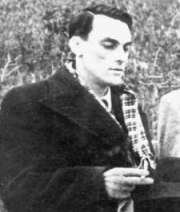Страница: 1
Am visat acest vis și încă-l mai visez
: Traducerea: Necula Florin Dănuț
 Стихотворения 2010-11-26 (10019 Показы) Стихотворения 2010-11-26 (10019 Показы)
Earthly
:
 Стихотворения 2011-01-10 (8399 Показы) Стихотворения 2011-01-10 (8399 Показы)
I dreamed this dream and I still dream of it
:
 Стихотворения 2006-08-29 (7323 Показы) Стихотворения 2006-08-29 (7323 Показы)
I waited for you yesterday since morning...
:
 Стихотворения 2009-11-03 (8130 Показы) Стихотворения 2009-11-03 (8130 Показы)
life, life
:
 Стихотворения 2005-07-09 (10972 Показы) Стихотворения 2005-07-09 (10972 Показы)
Life, life
: fragment
 Стихотворения 2009-09-24 (8849 Показы) Стихотворения 2009-09-24 (8849 Показы)
Life, life (2)
:
 Стихотворения 2010-12-03 (7934 Показы) Стихотворения 2010-12-03 (7934 Показы)
Și vremea a trecut ...
:
 Стихотворения 2008-04-24 (11531 Показы) Стихотворения 2008-04-24 (11531 Показы)
Страница: 1 |
|

|
|
|
|
Биография Arseny Tarkovsky
Arseny Alexandrovich Tarkovsky (Russian: Арсе́ний Алекса́ндрович Тарко́вский, June 25 [O.S. June 12] 1907, Elisavetgrad – May 27, 1989, Moscow) was a prominent Russian poet and translator. His poems appeared in the films The Mirror and Stalker, directed by Andrei Tarkovsky, his son.
Tarkovsky was born in Elisavetgrad to the family of a Narodnik on June 24 N.S. 1907. By 1924 he had moved to Moscow, and from 1924-1925 he worked for a newspaper for railroad workers called "Gudok."
Tarkovsky managed a section that was to be filled by an editorial written in verse, that was supposedly easier for the readers than the ordinary prosaic editorials. Each day, Tarkovsky would either write such poetical editorials himself, or find somebody else to do it. Needless to say, the poetry of these editorials usually was not of a very good quality.
In 1925-1929 he studied in a state university to be a professional writer of fiction. At that time he translated poetry from Turkmen, Georgian, Armenian and Arabic. During World War II he worked in the Army Newspaper Boevaya Trevoga (War Alarm).
In his lifetime Arseny Tarkovsky was mainly known as a splendid translator of Abu'l-Ala-Al-Ma'arri, Nezami, Magtymguly, Kemine, Sayat-Nova, Vazha-Pshavela, Adam Mickiewicz, Mollanepes, Grigol Orbeliani and many other poets.
He was a friend of Marina Tsvetaeva, and is sometimes referred to as the "Last Love of Marina Tsvetaeva". Being younger than Anna Akhmatova and Marina Tsvetayeva he imbibed the poetic traditions of the Silver Age generation and interpreted them through the prism of his personality in his creativity.
He composed his own poetry throughout his life, but did not publish it until his fifties. Then he published nine books of poetry:
Перед снегом - Before snow (1962);
Земле земное - Earthly to Earth (1966);
Вестник - Messenger (1969);
Стихотворения - Verses (1974);
Зимний день - Winter Day (1980);
Избранное - Selected works (1982);
Стихи разных лет - Verses of different years (1983) - compilation of early verses;
От юности до старости - From Youth to Senility(1987)
Благословенный Свет - The Blessed Light (1993 -posthumously).
He lived mostly in Moscow and Peredelkino and died on May 27, 1989 in Moscow. In 1989 he was posthumously awarded the USSR State Prize.
Tarkovsky's most famous poems are, perhaps,
Жизнь, Жизнь (Life, Life)
Первые Свидания (First Meetings)
These two are considered by some critics to be a part of the best poetry written in Russian in the 20th century. Also very famous are
С утра я тебя дожидался вчера...
"25 ИЮНЯ 1935
Отнятая у меня, ночами...
Если б, как прежде, я был горделив
|





